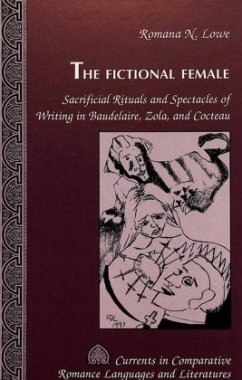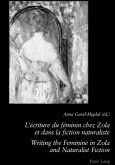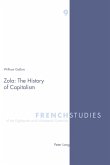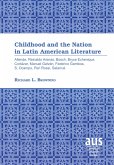Why are fictional females violently attacked and ultimately eliminated in nineteenth- and twentieth-century texts written by male authors? A specific and widespread pattern not only determines the fate of heroines in French fiction, but also affects us today. What leads a poet, a novelist and a playwright all in the same chilling direction? The connection between the artistic role of the fictional female and her untimely death is given in the analysis of Baudelaire, Zola, and Cocteau. This book demonstrates how and why women are "set up" to be sacrificed in a ritual that involves the very notions of gender and identity.
"Romana Lowe's fascinating book uses René Girard's theories of sacrifice to reveal the preponderance of one particular kind of sacrificial victim in nineteenth- and twentieth-century French texts: women. Through original and informative close readings of Baudelaire, Zola, and Cocteau she traces structures and images of female sacrifice in the three different genres of poetry, novel, and theater. The theoretical basis of the book and its illustration in three exemplary authors take the troubling implications of female sacrifice far beyond these authors and into the very structures of social order." (Dorothy Kelly, Chair, Department of Modern Foreign Languages and Literatures, Boston University)
"Romana Lowe's approach is original and has the potential to interest a broad range of specialists in the field and other readers. The originality consists in Lowe's deconstruction of the hidden phallocentric strategies and world views of a number of nineteenth- and twentieth-century French authors. The book not only examines misogyny but provides an in-depth explanation of it. The writing style is lively; the analyses of literary works are probing and insightful, and the argumentation is clear and easy to follow. It is an unusually well-written book. One of its strengths is the readability and the fluidity of its prose." (Doris Y. Kadish, Professor and Head, Department of Romance Languages, The University of Georgia)
"Romana Lowe's approach is original and has the potential to interest a broad range of specialists in the field and other readers. The originality consists in Lowe's deconstruction of the hidden phallocentric strategies and world views of a number of nineteenth- and twentieth-century French authors. The book not only examines misogyny but provides an in-depth explanation of it. The writing style is lively; the analyses of literary works are probing and insightful, and the argumentation is clear and easy to follow. It is an unusually well-written book. One of its strengths is the readability and the fluidity of its prose." (Doris Y. Kadish, Professor and Head, Department of Romance Languages, The University of Georgia)








